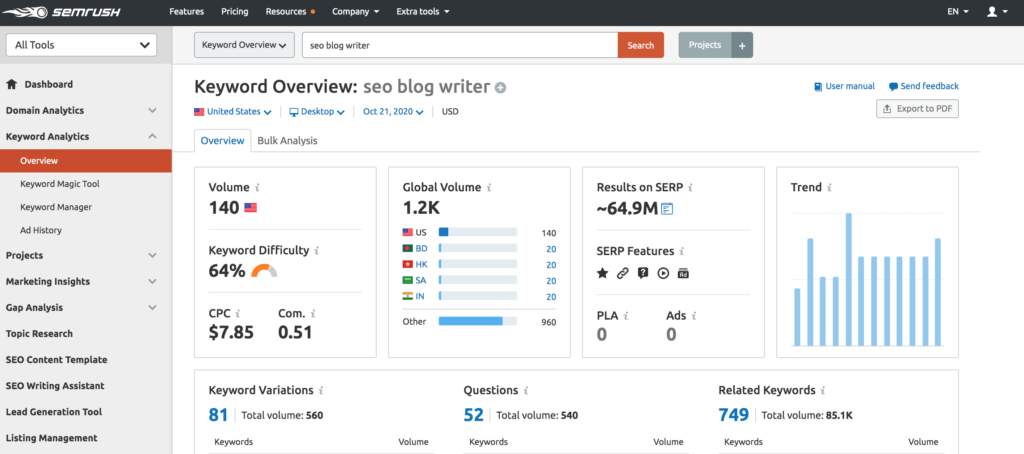Once small-to-mid-sized businesses realize the numerous benefits of blogging – something I wrote about for Forbes (Starting a Business Blog is a Must for Success: 8 Tips) – the challenges begin.
First, you must find blog writers who not only create quality content that educates and appeals to human emotion but are also timely and efficient. It also pays dividends if these writers are passionate about your industry and have experience blogging for your specific market.
Second, you must make sure those blogs are optimized for search. This is where, as a prospect-turned-client recently called it, “that SEO stuff” is needed.
When all the above elements combine, you’re blogging efforts will have a much greater impact. In simplest terms, the writer must create qualitative blogs that are optimized for search.

The not-so-simple part is getting this combination in one clean package – say a writer who is an expert blogger in your vertical and is also an SEO expert.
This is typically not a problem for large enterprise organizations with a major budget for internal SEO and content/copywriting teams.
But for most SMBs, the struggle is ongoing. Many substitute a long-term marketing strategy like frequent and consistent blogging for other strategies such as paid advertising.
First – What is the Value of SEO Blog Writing?
Most SMBs don’t understand the value of having a strong online presence built on various content marketing efforts, including on-site blogs – what I call “home- base” content marketing – and third-party guest blogs.
This type of content elevates brand awareness. Along the way,, it adds to the overall search value of your website as it naturally acquires more links from other reputable sources and provides education on what your services or products do. And the strategy only gets stronger when SEO is involved.
This is why your blogger(s) must learn how to write for SEO purposes. This should never be the full focus; quality content trumps all. But you want that quality content to be found, and the only way to do so is with SEO in mind.
Before I go further, realize that it’s much easier to train a good writer SEO than an SEO to write. This is exactly why I seek out a freelance journalist or traditional-trained writers and provide SEO guidelines for them to get it right and save some time, which translates into saving money for the client.
Many SMBs spend serious budget on SEO campaigns – and unfortunately, some of those campaigns don’t offer optimization of existing blog content or create new blog content.
These campaigns basically get your technical SEO bits up to spec and may include a rewritten headline (title tag) or meta description here and there, but that’s it. Some don’t even mention the benefits of blogging for overall website SEO.
This task of finding a blogger falls on you, which means more marketing dollars are spent. This is again where a blogger trained in SEO can be a huge benefit for your company – saving you time and money.
The following are six reasons why bloggers who know how to write for SEO should be a huge part of your content marketing strategy.
1. They Understand Keyword Research and Use
Blog writers trained in SEO understand keyword research – something that is absolutely critical for a single blog’s searchability and your overall website searchability.
Wise bloggers are always chasing the “long-tail” keywords that are more granular over the “short-tail” keywords, which are broader.
First, an explanation. I tell clients to think of the difference between long-tail and short-tail like adding an address into your GPS – the broader the keyword, the broader the destiny.
 Put in Philadelphia, and the GPS will take you to the city. Put in a street, and you’re more granular. Now add a house number, and you’re at the exact location. This is how I explain “broad” keywords such as Philly and “long-tail keywords” such as “526 Market St, Philadelphia, PA 19106.”
Put in Philadelphia, and the GPS will take you to the city. Put in a street, and you’re more granular. Now add a house number, and you’re at the exact location. This is how I explain “broad” keywords such as Philly and “long-tail keywords” such as “526 Market St, Philadelphia, PA 19106.”
An SEO-trained blog writer will also understand that they must only target one or two keywords per piece and use “semantically” related keywords. Tools such as SEMrush make finding these related keywords easy – but you still need to choose the keywords that provide value, and you must naturally use them.
Most businesses – especially SMBs I have dealt with – think keyword research is as simple as choosing keywords and sprinkling them within the content. But it’s not that simple, and only a quality writer with SEO skills will know what to do.

2. They Write Headlines with SEO in Mind
Your blog’s headline is one of the most important elements of a search engine. The headline sends the largest signal to the search engine and explains what the post is about, and a writer knowledgeable in SEO will know this.
The writer will also know that you want your target keyword in the headline (and hopefully, that keyword is long-tail as explained above).
Let’s say you owned a motorcycle shop that carried parts for only one specific Harley-Davidson model, say a Sportster. Using a headline like “9 Reasons to Upgrade Your Motorcycle’s Exhaust” is too broad.
“9 Reasons to Upgrade Your Harley’s Exhaust” is better but still too broad. But if you said “9 Reasons to Upgrade your Sportster’s Exhaust,” you’ll be addressing the prospects you want – owners of Sportsters.
Also, SEO-trained blog writers understand that various headlines do better than others, such as listicle titles with numbers in them.
3. They Write Optimized Meta Description
Meta descriptions are the short lines of text that are placed under the title in search engine results:
 They are typically truncated after 160 characters, and if not customized, the search engines will insert the first lines of text from the blog posts. This is not strategic for explaining what the blog post is about.
They are typically truncated after 160 characters, and if not customized, the search engines will insert the first lines of text from the blog posts. This is not strategic for explaining what the blog post is about.
Quality SEOs understand that these meta descriptions should be unique and provide an incentive for searchers to open up your post over your competitors.
The first thing that will attract the eyes is the title. If you did your job well, the title would immediately cause some curiosity or value for searchers, prompting them to read the complementing meta description.
At only 160 characters, these meta descriptions need to be short and snappy and immediately grab the searcher’s intention. Also, an SEO knows it’s smart to use the target keyword in the meta description. If a searcher places your target keyword in the search query box, it’ll show up bold in your meta description, driving more attention to your post than those who don’t optimize their meta descriptions.
4. They Optimize Images
Yes – images are typically inserted into a blog, and that’s it. For true optimization, each image should have a unique title and “alt text,” which is short for alternative text. These are embedded into the blog’s code and help tell search engine crawlers exactly what the image is – crawlers can’t read an image.
Alt Text helps properly index an image, which means it will show up in the search results if someone is searching for the keywords of that image.
Google Images is huge for many businesses, such as those in the aftermarket automobile accessories or food industries. Imagine if you were selling a set of wheels, and someone wants to see them. If your picture is indexed for the keyword(s) associated with those wheels and that person clicks to look at your picture, they can be taken to your website.
And if you set up that page or blog correctly to provide valuable information to the searcher, you now have a prospect that can become a customer. All through a simple image that contained the correct SEO enhancements and take seconds to optimize – a task an SEO-trained writer can do.
5. They Optimize On-Page SEO Elements
An SEO-trained blogger will understand how valuable keyword research is and how to create optimized titles and meta descriptions.
That’s a huge part of the process – but there are also numerous on-page SEO elements.
An SEO blog writer will understand the value in using various sub-topics to break up the text, or as SEOs call them, headline tags (H1, H2, H3, etc. tags). The smaller the number, the larger the text.
You always want one H1 tag – which is typically the headline/title of the article – and a few smaller ones to divide the content by subject matter. Again, these headline tags think subtopics – send stronger signals to search engines about the blog’s content, so try to use the target keyword in at least one and a few related keywords in others.
These subtopics also increase user experience by allowing readers to quickly scan the article and digest the most valuable information.
The other significant on-page SEO elements are internal/external links to relevant pages and the “anchor” text used to hyperlink a word or phrase to the respective linking page.
Contextual internal links are vital for user experience – they help a reader link to another page on your website that further explains the hyperlinked word. This also helps with your website’s crawlability because you’re providing a road map to them.
External links are also important because you can create credibility for the information you use in both the reader and the search engine.
One word that may be brought up is “keyword density” – basically how many times a keyword is used within an article. We disregard all thoughts on this BS and tell writers to create content naturally. The target keyword has its most strength in the main title and will naturally be used in the article if it is truly the target keyword.
Besides on-page SEO, off-page SEO also exist. Moz says off-page SEO “refers to actions taken outside of your own website to impact your rankings within search engine results pages (SERPs).”
In most basic terms, off-page SEO is all about others linking to your website or content. That’s a true sign that you’re offering what I call TAR – Trust, authority, and reputation.
SEOs understand that links from other reputable websites are vital to a website’s performance.
6. Finally – They Save Money
When you have an SEO-trained blog writer, the blog will already be optimized for all elements above. This provides what I call a “Plug N’ Play” format for the person uploading the blog, which 90% of the time knows squat about SEO.
Having each blog optimized before uploading will greatly enhance your search results – especially if in the long term if you are consistent and frequently blogging, and your website’s technical platform is optimized.
This means you don’t need an in-house SEO. And if you rely on a third-party web developer to upload your content, again, you won’t have to worry about all the necessary SEO elements. For full impact, it should go without saying that your website should be fully optimized from a technical perspective.

I had many SMB clients that went through the following process, typically laid out in monthly stages:
- SEO Audit of existing website
- Technical SEO Strategy and Implementation
- Keyword Research and Keyword Mapping (map keywords to proper pages for optimized website hierarchy)
- Optimize Existing Pages/Blogs (use keyword research and rewrite title tags and meta descriptions; optimize on-page elements such as H tags and internal links)
Once a website is optimized, it’s time to start aggressively blogging – all with SEO in mind, of course.
If you have a blogger that needs SEO training or want to outsource all your blogging efforts with SEO in mind, contact ContentMender below for a free consultation.




